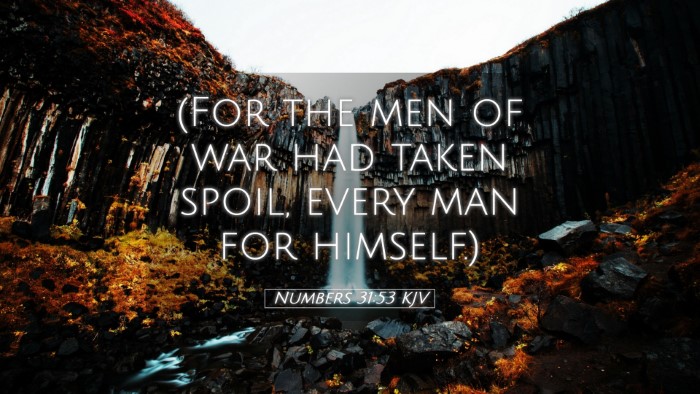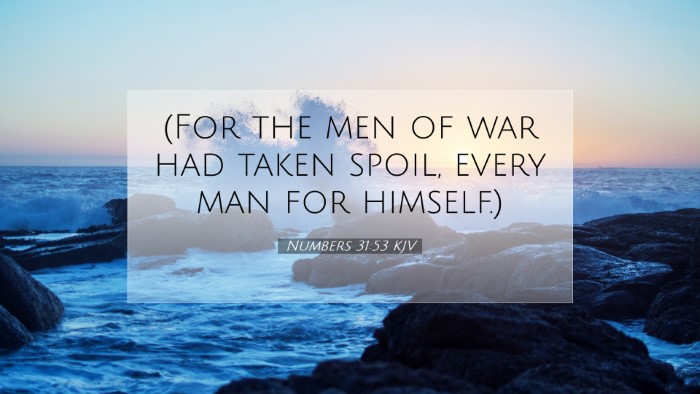Commentary on Numbers 31:53
Verse Context: Numbers 31:53 states, "For they brought the captives, and the prey, and the spoil unto Moses, and Eleazar the priest, and unto the congregation of the children of Israel, unto the camp at the plains of Moab, which are by Jordan near Jericho." This verse captures a pivotal moment in Israel’s narrative, following their conflict with the Midianites, highlighting themes of obedience, justice, and the divine imperative.
Introduction
This verse marks the intersection of obedience to divine command and the weight of moral responsibility in victory. It shows the aftermath of Israelite engagement and the management of war spoils, depicting a crucial obedience to God’s law, which had significant theological implications. Commentators throughout history have meticulously examined this text, contextualizing it within Israel's wilderness journey and revealing insights applicable to contemporary faith practices.
Theological Implications
The capturing and bringing forth of the spoils signify the fulfillment of God’s directive to punish the Midianites for their seduction of Israel into idolatry and immorality. This accountable action reinforces God's justice and the importance of communal responsibility in the covenant community.
- Understanding Obedience: The Israelites displayed a commitment to the covenant by adhering to God's instructions—demonstrating that divine orders must be followed in totality, even during warfare.
- Preservation of Holiness: The act of bringing the spoils to Moses and Eleazar illustrates a pivotal understanding of holiness: that all things taken in battle belong to God and must be treated with respect and designated for sacred purposes.
- Community Responsibility: The collection and presentation of the spoils demonstrate the communal aspect of Israel’s faith. Leadership within the congregation must ensure that actions taken in pursuit of God’s commandments benefit the entire community.
Commentary Insights
Matthew Henry’s Perspective
Matthew Henry emphasizes the significance of the spoils being dedicated and brought before spiritual leaders. He notes that this act represents an acknowledgment of God's providence and goodness. Henry reflects on the moral obligations incumbent upon those who are successful in battle; it is a reminder that earthly victories carry spiritual responsibilities. He posits that the captured lives and goods serve to illustrate God’s favor and judgment.
Albert Barnes’ Analysis
Albert Barnes expands on the idea of the distribution of spoils and the requirement for accountability. He points out that the priestly involvement signals the acknowledgment of God's rightful claim to the spoils. Furthermore, he highlights the method of division specified for the spoils, emphasizing that they are to be shared among the warriors and the wider community, ensuring no single group claims entitlement over others. Barnes asserts this model fosters unity and equal distribution amongst the tribes, strengthening communal bonds.
Adam Clarke’s Insights
Adam Clarke presents a comprehensive historical and cultural context surrounding Israel's treatment of war spoils. He indicates that the act of bringing the spoils before Moses encapsulates the heart of Israel's governance model, rooted deeply in respecting divine laws. Clarke addresses the spiritual symbolism inherent in the spoils as illustrative of judgment—reminding the Israelites, and future generations, of the consequences of sin and the sanctity of obedience to God’s commands.
Lessons for Contemporary Believers
As contemporary believers examine Numbers 31:53, several key lessons arise that speak to modern faith contexts:
- The Importance of Obedience: Just as the Israelites acted in accordance with God's command, believers today must strive to understand and execute God's will in their lives, recognizing that obedience is integral to spiritual growth.
- Holiness and Accountability: The call to holiness remains pertinent; believers are encouraged to evaluate how they manage 'blessings' equitably while acknowledging they're ultimately gifts from God.
- Community Over Individualism: In a society that often prioritizes the individual, this passage reaffirms the need for communal bonds and shared responsibilities within the body of Christ. It serves as a reminder that personal gains should be oriented towards the welfare of the community.
Conclusion
The act of bringing the spoils to Moses, Eleazar, and the congregation is far more than a logistical detail; it encapsulates profound theological truths about authority, sanctity, communal responsibility, and the expectations of a covenant relationship with God. As such, Numbers 31:53 serves as a critical reminder for modern Christians regarding the alignment of their actions with God’s holiness and the imperative of community in the practice of faith.


